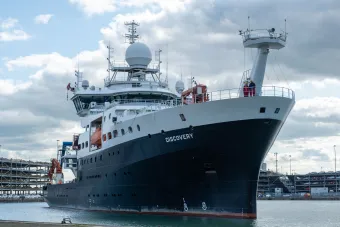
The National Oceanography Centre (NOC) has contributed to a new European Marine Board (EMB) Position Paper, launched today, which provides an overview of the current European research vessel fleet and its capabilities, and recommends ways in which it should evolve to meet future science needs.
The Position Paper – titled ‘Next generation European research vessels: Current status and foreseeable evolution’ – is the result of a collaboration with the European Research Vessel Operators group and can be downloaded from the EMB website. The publication is an official output of the EMB, a strategic pan-European Forum of 33 member organisations including key marine research institutes, funding agencies and university consortia.
Further developing our understanding of the ocean is fundamental to addressing many of the global challenges facing society today, such as climate change and food security. Research vessels are a key infrastructure enabling scientists to gather vital data and conduct the research required to expand our knowledge. However, large sophisticated research vessels and their equipment are inevitably expensive. It is therefore critical that their importance and indispensable role is clearly communicated and that appropriate investments are made to ensure the ongoing provision of support for scientific research.
The European research vessel fleet plays a vital role in supporting scientific research and development not just in Europe but also across the globe. Research vessels are essential in ocean observation as they are used to collect a wide variety of data and samples from the atmosphere, the ocean surface, the water column, the seabed, and the ground below it. In addition, research vessels are critical for deploying, maintaining and recovering stationary installations on the ocean floor, in the water column or on the surface, as well as providing ground-truthing for subsea vehicles, such as the NOC’s Autosub Long Range.
This new publication presents an overview of the current European fleet, including the NOC’s two ships RRS Discovery and RRS James Cook, its capabilities and its management. It then looks to the future, highlighting what will be needed to ensure that the European fleet can continue to provide a high level of support to science, in particular in specialised areas such as the deep sea and Polar regions. It also goes beyond the fleet itself, to consider the training of fleet personnel, effective fleet management, and the role of research vessels in the wider context of ocean observations and the European Ocean Observing System (EOOS).
The report finds that the current European research vessel fleet is highly capable, and is able to provide excellent support to European marine science and wider scientific research, and can lead on the world stage. However, with the typical life expectancy of a research vessel of 30 years, the fleet is ageing and requires further investment if it is to continue to be as efficient and capable as the scientific community expects and requires.
Leigh Storey, NOC Associate Director, National Marine Facilities, commented: “The UK operates two of the most capable multi-role research ships within Europe which, when combined with the UK’s National Marine Equipment Pool, also operated by the NOC, and our world-leading, technology development programmes in marine sensors and autonomous platforms, are able to support complex, oceanographic research in all areas of the global ocean.
“I welcome this report and hope it provides a useful guide to anyone interested in the infrastructure necessary to support the important scientific research required to make sense of our changing seas.”
Download the full Position Paper – ‘Next generation European research vessels: Current status and foreseeable evolution’